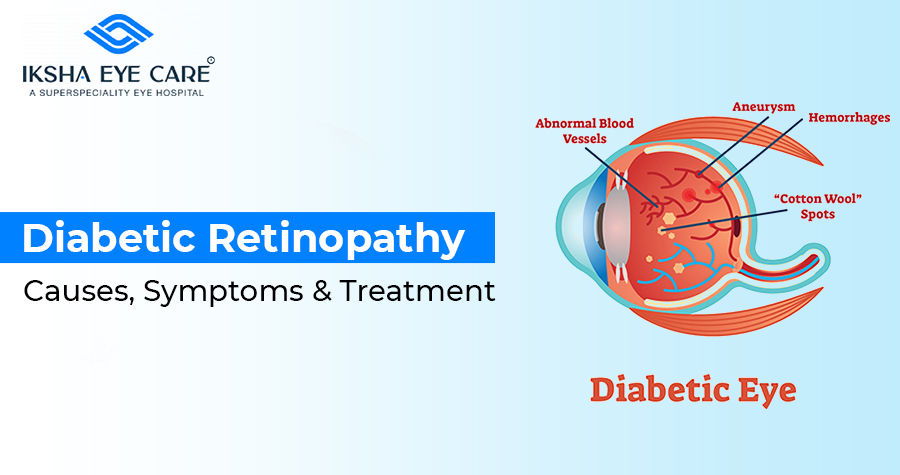Introduction
Imagine waking up one day to find your vision blurred, making it difficult to read, drive, or even recognize the faces of your loved ones. For millions of people with diabetes, this is not just a fear, it is a reality. Diabetic retinopathy is a serious complication of diabetes that can lead to vision loss if not managed properly. However, with early detection and proper treatment, blindness can be prevented.
This article explores everything you need to know about diabetic retinopathy causes, symptoms, and treatment options, especially if you are looking for diabetic retinopathy treatment in Mumbai.
What is Diabetic Retinopathy?
Diabetic retinopathy is a condition that affects the blood vessels of the retina, the light-sensitive tissue at the back of the eye. It occurs when high blood sugar levels cause damage to these tiny blood vessels, leading to leakage, swelling, and, in severe cases, the formation of new abnormal blood vessels that can cause bleeding and scarring.
Diabetic retinopathy is a progressive condition and one of the leading causes of blindness worldwide, particularly among working-age adults.
Causes of Diabetic Retinopathy
The primary cause of diabetic retinopathy is prolonged high blood sugar levels that damage the blood vessels in the retina. However, several factors can increase the risk of developing this condition:
- Duration of Diabetes: The longer you have diabetes, the greater your risk of developing diabetic eye disease.
- Poor Blood Sugar Control: Consistently high glucose levels contribute to blood vessel damage.
- High Blood Pressure and Cholesterol: These conditions can accelerate the damage to retinal blood vessels.
- Smoking: Increases the risk of blood vessel complications.
- Pregnancy: Women with diabetes are more prone to developing eye problems caused by diabetes during pregnancy.
Symptoms of Diabetic Retinopathy
In the early stages, diabetic retinopathy symptoms may be mild or even unnoticeable. However, as the condition progresses, you may experience:
- Blurred Vision: Due to swelling in the retina.
- Floaters: Dark spots or strings in your vision caused by bleeding.
- Distorted Vision: Straight lines may appear wavy.
- Difficulty Seeing in Low Light: A common symptom as the retina is affected.
- Sudden Vision Loss: This occurs in advanced stages when bleeding inside the eye becomes severe.
If you notice any of these symptoms, it is crucial to seek immediate medical attention.
Stages of Diabetic Retinopathy
Diabetic retinopathy stages are classified into four main phases:
- Mild Nonproliferative Retinopathy: Small areas of swelling occur in the tiny blood vessels of the retina.
- Moderate Nonproliferative Retinopathy: The blood vessels become blocked, restricting blood flow.
- Severe Nonproliferative Retinopathy: More blood vessels become blocked, leading to oxygen deprivation in the retina.
- Proliferative Diabetic Retinopathy: New abnormal blood vessels start growing, leading to leakage, scarring, and possible retinal detachment.
Diabetic Retinopathy Diagnosis
Early detection is key to preventing vision loss. Diabetic retinopathy diagnosis involves several tests, including:
- Dilated Eye Exam: Eye drops are used to widen the pupil for a detailed examination.
- Fluorescein Angiography: A dye is injected to highlight damaged blood vessels.
- Optical Coherence Tomography (OCT): Provides detailed cross-sectional images of the retina.
Treatment Options for Diabetic Retinopathy
Treatment for diabetic retinopathy depends on the stage of the disease. Some common diabetic retinopathy treatments include:
1. Managing Blood Sugar, Blood Pressure, and Cholesterol
Controlling diabetes through medication, diet, and lifestyle changes is crucial to slow the progression of diabetic eye disease.
2. Laser Therapy (Photocoagulation)
Laser treatment seals leaking blood vessels and prevents further abnormal growth, helping to reduce vision loss.
3. Anti-VEGF Injections
Medications like Avastin, Eylea, and Lucentis help reduce swelling and prevent abnormal blood vessel growth.
4. Vitrectomy
In advanced cases, diabetic retinopathy surgery may be required. A vitrectomy involves removing the vitreous gel and blood from the eye to restore vision.
Diabetic Retinopathy Treatment in Mumbai
If you are looking for diabetic retinopathy treatment in Mumbai, you are in good hands. The city has some of the best eye hospitals and specialists offering advanced treatments such as:
- Comprehensive Eye Exams
- State-of-the-Art Laser Treatments
- Affordable Vitrectomy Surgeries
- Expert Retinal Specialists
Finding the right specialist can make all the difference in preserving your vision.
Preventing Diabetic Retinopathy
While there is no guaranteed way to prevent diabetic retinopathy, the following measures can help reduce the risk:
- Keep Blood Sugar Levels Under Control
- Monitor Blood Pressure and Cholesterol
- Regular Eye Check-ups
- Quit Smoking
- Maintain a Healthy Lifestyle
Conclusion
Diabetic retinopathy is a serious but manageable condition. By understanding the diabetic retinopathy causes, symptoms, and treatment options, you can take proactive steps to protect your vision. If you are in Mumbai, there are excellent treatment options available to help you preserve your sight. Don’t wait for symptoms to worsen—schedule an eye check-up today!
Frequently Asked Questions (FAQs)
1. Can diabetic retinopathy be reversed?
Early-stage diabetic retinopathy can be managed, but advanced stages may cause permanent damage. However, treatments like laser therapy and injections can slow its progression.
2. Is diabetic retinopathy painful?
No, diabetic retinopathy itself does not cause pain. However, severe cases can lead to discomfort due to complications like retinal detachment.
3. How often should diabetics get their eyes checked?
It is recommended that people with diabetes have a comprehensive eye exam at least once a year.
4. Can diabetic retinopathy lead to blindness?
Yes, if left untreated, diabetic retinopathy can cause irreversible blindness. Early detection and treatment can prevent severe vision loss.
5. Are there any home remedies for diabetic retinopathy?
While home remedies cannot cure diabetic retinopathy, maintaining a healthy diet, exercising, and controlling blood sugar levels can help slow its progression.















